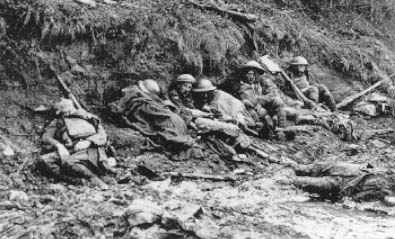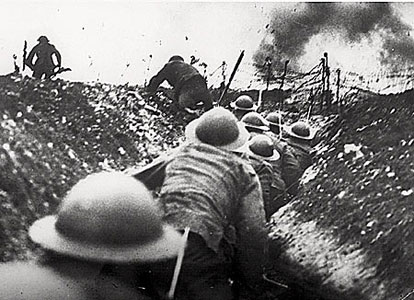At the 11th hour on the 11th day of the 11th month of 1918, the Great War ends. At 5 a.m. that morning, Germany, bereft of manpower and supplies and faced with imminent invasion, signed an armistice agreement with the Allies in a railroad car outside Compiégne, France.

On June 28, 1914, in an event that is widely regarded as sparking the outbreak of World War I, Archduke Franz Ferdinand, heir to the Austro-Hungarian empire, was shot to death with his wife by Bosnian Serb Gavrilo Princip in Sarajevo, Bosnia. Ferdinand had been inspecting his uncle’s imperial armed forces in Bosnia and Herzegovina, despite the threat of Serbian nationalists who wanted these Austro-Hungarian possessions to join newly independent Serbia. Austria-Hungary blamed the Serbian government for the attack and hoped to use the incident as justification for settling the problem of Slavic nationalism once and for all. However, as Russia supported Serbia, an Austro-Hungarian declaration of war was delayed until its leaders received assurances from German leader Kaiser Wilhelm II that Germany would support their cause in the event of a Russian intervention.
On July 28, Austria-Hungary declared war on Serbia, and the tenuous peace between Europe’s great powers collapsed. On July 29,
For the most part, the people of Europe greeted the outbreak of war with jubilation. Most patriotically assumed that their country would be victorious within months. Of the initial belligerents, Germany was most prepared for the outbreak of hostilities, and its military leaders had formatted a sophisticated military strategy known as the “Schlieffen Plan,” which envisioned the conquest of France through a great arcing offensive through Belgium and into northern France. Russia, slow to mobilize, was to be kept occupied by Austro-Hungarian forces while Germany attacked France.
The Schlieffen Plan was nearly successful, but in early September the French rallied and halted the German advance at the bloody Battle of the Marne near Paris. By the end of 1914, well over a million soldiers of various nationalities had been killed on the battlefields of Europe, and neither for the Allies nor the Central Powers was a final victory in sight. On the western front—the battle line that stretched across northern France and Belgium—the combatants settled down in the trenches for a terrible war of attrition.
In 1915, the Allies attempted to break the stalemate with an amphibious invasion of Turkey, which had joined the Central Powers in October 1914, but after heavy bloodshed the Allies were forced to retreat in early 1916. The year 1916 saw great offensives by Germany and Britain along the western front, but neither side accomplished a decisive victory. In the east, Germany was more successful, and the disorganized Russian army suffered terrible losses, spurring the outbreak of the Russian Revolution in 1917. By the end of 1917, the Bolsheviks had seized power in Russia and immediately set about negotiating peace with Germany. In 1918, the infusion of American troops and resources into the western front finally tipped the scale in the Allies’ favor. Germany signed an armistice agreement with the Allies on November 11, 1918.
World War I was known as the “war to end all wars” because of the great slaughter and destruction it caused. Unfortunately, the peace treaty that officially ended the confli…the Treaty of Versailles of 1919…forced punitive terms on Germany that destabilized Europe and laid the groundwork for World War II.

